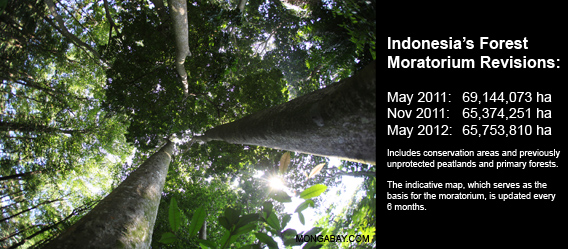 Indonesia’s forest moratorium – by the numbers. Indicative map May 2012 revision.
Indonesia’s forest moratorium – by the numbers. Indicative map May 2012 revision.
Indonesia’s moratorium on new forest concessions will not be enough to meet its 2020 emissions reduction target says the largest backer of the country’s forest and climate action plan.
Norwegian environment minister Bard Vegar Solhjell told Reuters on Tuesday that Indonesia’s two-year moratorium on logging and plantation concessions in peatlands and primary forests “is not sufficient to reach the climate mitigation pledged, or to stop deforestation in the speed that is necessary.”
Solhjell’s remarks are the first time Norway was acknowledged the moratorium may not be working, according to Reuters. Environmentalists have been warning the same since the moratorium was signed just over a year ago. The moratorium excludes vast areas of secondary forests as well as existing concessions in peatlands and primary forests. The moratorium also has carve-outs for mining, energy development, and some crops.
But the moratorium nonetheless is important in introducing governance reforms, which could yield long-term benefits for Indonesia’s forests and forest-dependent communities. The forestry sector in Indonesia has been rife with corruption, land conflict, and poor management, leading to high rates of deforestation and forest degradation.
The moratorium, which took effect January 1, 2011 but wasn’t officially defined until last May, aims to slow Indonesia’s deforestation rate, which is among the highest in the world and, together with peatlands degradation, accounts for more than 70 percent of the country’s emissions. Indonesia agreed to establish the moratorium as part of its reducing emissions from deforestation and degradation (REDD+) agreement with Norway. Under the pact, Norway will provide up to a billion dollars in funds contingent on Indonesia’s success in curtailing destruction of carbon-dense forests and peatlands. Norway had pushed for a moratorium on all forest areas, but intense lobbying by powerful forestry interests succeeded in having the moratorium narrowly defined. The battle over the moratorium has at times represented a power struggle between the Ministry of Forestry, which earns billions a year from issuing forest concessions, and the REDD+ task force, which is working to reform the country’s forest management practices and institutions.
Related articles
(02/27/2012) Indonesia’s moratorium on new forest concessions alone “does not significantly contribute” to its goal of reducing greenhouse gas emissions 26 percent from a projected 2020 baseline, concludes a new analysis by the World Resources Institute (WRI). However the study says the moratorium does support the target in the long-term by creating a window for enacting governance reform needed to stop destructive business-as-usual approaches to forest management.
Is the Ministry of Forestry undermining Indonesia’s logging moratorium?

(06/28/2011) Indonesia’s Ministry of Forestry is already undermining the moratorium on new forestry concessions on peatlands and in primary forest areas, alleges a new report from Greenomics-Indonesia. The report, The Toothless Moratorium, claims that a new decree from the Ministry of Forestry converts 81,490 hectares of forest protected under the moratorium into logging areas. The area affected is larger than Singapore.
Indonesia’s moratorium disappoints environmentalists

(05/20/2011) The moratorium on permits for new concessions in primary rainforests and peatlands will have a limited impact in reducing deforestation in Indonesia, say environmentalists who have reviewed the instruction released today by Indonesian President Susilo Bambang Yudhoyono. The moratorium, which took effect January 1, 2011, but had yet to be defined until today’s presidential decree, aims to slow Indonesia’s deforestation rate, which is among the highest in the world. Indonesia agreed to establish the moratorium as part of its reducing emissions from deforestation and degradation (REDD) agreement with Norway. Under the pact, Norway will provide up to a billion dollars in funds contingent on Indonesia’s success in curtailing destruction of carbon-dense forests and peatlands.